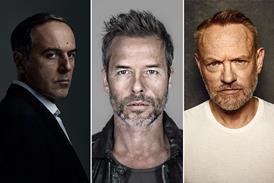Phil Donahue is a household name in the US, famous for his eponymous talk show and a TV career that spanned three decades. But that does not mean making his first feature documentary was a piece of cake.
'I feel like I'm in a dark hallway, feeling my way around. This is new to me,' the TV veteran confessed during his first trip to the Toronto International Film Festival, where Body Of War had its world premiere.
New York-based Donahue said the project evolved organically. When he was visiting Ralph Nader, the politician suggested Donahue accompany him to Walter Reed Army Medical Center to meet an injured Iraq veteran. The pair were changed by their meeting with 25-year-old Tomas Young, who was in Iraq for five days before being shot and paralysed. 'To stand there with my perfectly functioning legs, I thought, 'I can't just bail out on this guy,'' Donahue says.
He considered turning Young's story into a book but then was inspired by young people with digital cameras at a Media Reform conference and decided to join the digital revolution.
He was referred to Texas-based Mobilus Media, where he met Ellen Spiro, the film's co-director and cinematographer. 'Ellen and I met at the Kansas City airport, went to see Tomas and over two years later we're in the Toronto film festival,' Donahue says.
He funded the production himself, something that would have been unheard of in his TV days. 'I'd never had my money on the table. I self-funded this and that will focus your mind,' he laughs.
The idea was to film the eloquent Young and his family in intimate situations as they adjusted to his radically altered life after the war and campaigned with Iraq Veterans Against The War.
'You're inside the home of an American family who has made this enormous contribution and whose lives have been changed,' Donahue says. 'And this drama is playing itself out in thousands of homes behind closed doors. And people aren't filming that.'
Scenes of the family's lives are intercut with the 2002 debate in the US senate of whether or not to go to war.
One of Donahue's goals in making a theatrically aimed documentary was to present a side of the Iraq war that corporate media, such as major TV networks, has been unable to show. 'This administration said, 'You can't film the caskets coming home.' And the American media establishment said, 'Oh, okay,'' he says. 'We should have been outraged. We want our film to be a small part of the groundswell of opposition to this war.'
Donahue says his first documentary has been an educational experience, and he is not ruling out another one. He thinks Young's story could warrant a sequel. 'This is just one chapter in this man's life,' he says of Body Of War. 'I would never want to be out of Tomas' life, it's been an emotional experience.'
Along with Young's specific ordeal, Donahue says he is inspired by the democratisation of film-making through digital technology. 'This technology is going to save us from corporate media,' he predicts. 'You don't have to alter a scene for lights and equipment. Oh man, what you get is so real.'
In Toronto, the documentary was second runner-up for the audience award. The Film Sales Company is handling international sales.



















No comments yet